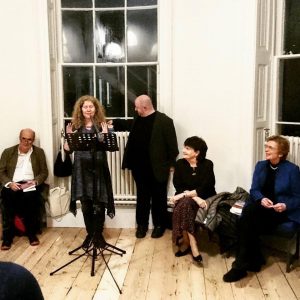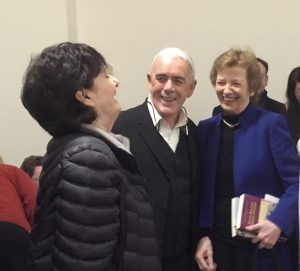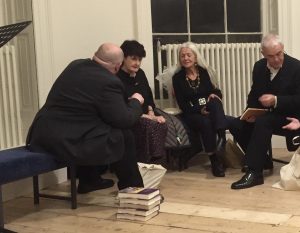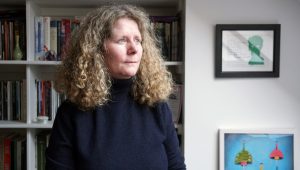The belated discovery of a role model: Nessa O’Mahony on Eavan Boland
The month of November, with its decreasing hours of daylight and lengthening nights, offers an opportunity to turn inwards. It is traditionally a month in Ireland when we remember those who have passed on, indeed the 1st and 2nd of November are known respectively as All Saints and All Souls days. On Trasna our focus this month will be on Irish writers who have passed on and who are remembered by contemporary writers and scholars.
Our first post this month is by poet Nessa O’Mahony who writes of the influence of the poet Eavan Boland (1944 – 2020) on her own development as a writer, which led to her subsequently co-editing a scholarly work on Boland, with writer Siobhán Campbell, Eavan Boland: Inside History published in 2017 by Arlen House.
~
The lack of women role models in Irish literature has often been commented upon. When I studied literature in University College Dublin in the early 1980s, you would have been hard pressed to find examples of women writers on the curriculum. I do remember we studied Maria Edgeworth and Emily Dickinson, but when we entered the 20th century, the reading lists were determinedly masculine, set with great confidence and conviction by a predominantly male faculty. Indeed, the nearest we got to the feminine in some classes was when a lecturer described Leopold Bloom as a ‘womanly’ man. If there was a living, breathing source of women writers whose texts we might study, they weren’t sharing that information in the tile-floored corridors of Belfield. The fact that the three Es – Eilis Dillon, Eiléan Ní Chuileanáin and Eavan Boland – were already well published Irish women writers – was neither here nor there.
But I didn’t see myself as a writer then, so my concerns about lack of exemplars were retrospective. It wouldn’t have occurred to me to question the bias that was to become so evident in later years. Great writers were male and dead, and that was that.
And so it continued until I made my first tentative steps into the world of literature in the mid-90s, and began to discover that not only were there living, breathing women writers out there, they were in plentiful supply in Ireland. Their words could be found in pamphlets, collections, the occasional anthology. And even if some of those anthologies had to be published to redress the balance of the absence of women in other anthologies, they were still providing opportunities for me, and others like me, to get myself heard.
And yet when I first read Eavan Boland – her memoir Object Lessons, not a collection of poetry – I could still be shocked that a woman might write so seriously about her own poetics, be so concerned with her own position as a poet and a woman in Ireland. That seemed to me to be man’s work – a woman positioning herself in such a way seemed unseemly to me. The conditioning of a third level education had yet to wear off.
But as ever, with poetry, the cure for such lack of awareness is to read, and to listen. I remember attending a reading of Eavan’s in Dublin in the late 1990s – I think it must have been around the publication of her collection The Lost Land. The venue was the Royal Irish Academy on Dawson Street, I seem to remember, and Eavan’s reading was typically lucid, precise and provoking. When the reading had ended, the crowd gathered for the book signing, and yet I felt there was a distance between us and the poet who had engrossed them over the previous 40 minutes. Shyness, perhaps, or diffidence, on both sides. We hadn’t yet learned how to read this poet, this woman whose purpose had a seriousness we didn’t know how to navigate, used as we were to the hail-fellow, well met smiling public men of poetry.
Perhaps I’m mis-remembering. The next reading of hers I do recall was a much smaller affair in the back-garden of a bookshop in the leafy Dublin suburb of Rathgar. Eavan was reading the poem, ‘The Black Lace Fan My Mother Gave Me’, whilst a piece of artwork a young artist had made responding to the poem hung on a stand beside her. There was no lighting outside, so as the late Irish summer gave way to dusk, Eavan needed candlelight to complete her performance. She held the book in one hand, the candle-holder in the other, and her voice, that uniquely precise tone, gave the event an ethereal atmosphere. It felt intimate, and those listeners felt very lucky to be there.
But still I didn’t know her, and wouldn’t have done had my friend and colleague Siobhán Campbell not approached me with the idea for a scholarly work she’d long been planning – a book of essays responding to Eavan in the context of the poet’s 70th birthday. Incredibly, such a work had not yet been produced, in Ireland or elsewhere. Siobhán wanted to fill the vacuum, and we had little difficulty persuading the poets, scholars and academics we approached to write a response. The project gave me a reason to read everything Eavan had written, and to finally understand the consistency of her vision. To my deep surprise, I shared some of her obsessions. Although my political awareness was still blunted, as a student of history I could respond to her preoccupations with what history can teach us, and more importantly, how the omissions from the historical record needed to be put right.
 Launching Eavan Boland: Inside History l to r: Colm Tóibín, Nessa O’Mahony, Alan Hayes (Arlen House), Eavan Boland, former President Mary Robinson
Launching Eavan Boland: Inside History l to r: Colm Tóibín, Nessa O’Mahony, Alan Hayes (Arlen House), Eavan Boland, former President Mary Robinson
We didn’t consult with Eavan during the production of Eavan Boland: Inside History, but it was important to us that she be happy with the concept, and her demeanour on the night it was launched, two years after her 70th birthday, at a crammed Poetry Ireland, indicated that she was. The reserved, serious person I’d first seen nearly two decades earlier had been replaced by a smiling, approachable woman who had time for everyone there to celebrate a lifetime’s achievement. And she took nothing for granted. As the evening drifted into night, and she was still surrounded by fans and well-wishers, I felt that my job had been done and I was ready to leave. As I was going out the door, I heard her voice behind me, calling me back. She’d wanted to tell me how grateful she was to Siobhán and me for the work we’d done. I stuttered back how grateful we were for the work she’d done, for us, and for women writers everywhere.
 Eavan Boland with poet Theo Dorgan and lifelong friend, former President Mary Robinson
Eavan Boland with poet Theo Dorgan and lifelong friend, former President Mary Robinson
Our paths crossed a few times after that – she’d taken on the role of editor of Poetry Ireland review, and attended many of the launches of the journal during that time. It felt as if she had embraced the Irish poetry scene as warmly as it was embracing her, after decades of shyness and distance. Under her editorship, the journal became a more inclusive and diverse space – each issue introduced new names and shook our assumptions of what Irish poetry was, or should be.
 Alan Hayes, Eavan Boland, Paula Meehan and Theo Dorgan
Alan Hayes, Eavan Boland, Paula Meehan and Theo Dorgan
Then in the summer of 2017, I was asked to undertake a public interview with Eavan in London. The prestigious Irish Literary Society was hosting the London launch of Eavan Boland: Inside History, and Eavan had graciously agreed to be interviewed at the event. I was to be the interviewer.
That might have been reason enough for the nerves to flutter as I walked in the steps of the Bloomsbury. In fact I was quite sanguine at the prospect of conducting a public interview. I’d done my research, prepared my questions, and was fairly confident that I would acquit myself well.
No, what was bothering me now was the suggestion I’d made some weeks earlier that I and Eavan should have a cup of tea to chat before the event, an invitation she’d graciously accepted. And whilst I’d met her several times before at poetry events, I’d never actually spent any time alone in her company. The social responsibility was terrifying.
I’d googled suitable places close to the Bloomsbury Hotel, where the interview was to take place, and had found one that seemed eminently appropriate. Tea and Tattle was a tea-room over an antiquarian bookshop and was resplendent with mahogany tables groaning under tiered bone china cake-stands and an eclectic mix of Crown Derby tea cups and saucers.
I arrived first, Eavan shortly afterwards, and there followed a simply delightful 60 minutes or so of a little tittle, quite a lot of tattle, and not much solemnity at all. The incisiveness so many have commented upon was there, when the talk briefly touched on infamous anthologies of the past, but the overall tenor was warm and witty, light and companionable.
There was, I came to realise, a public and a private Eavan. The public persona was impressive if austere, the formidable intellect breath-taking in its allusiveness; the private person could be giggly and mischievous. She was a very human and humane person, of great kindness and consideration.
I would go on to interview the public persona that evening in Bloomsbury, but what I’ll remember most are those 60 minutes over tea and buns when we set the world to rights.
I learned about her sudden death, on the 27th April of this year, like many did, through social media. Around teatime of that day, my twitter feeds began to fill up with news of her passing; tweets were sent and resent, comment was laid over comment as a community, not just poets and writers but readers and thinkers and anyone who had ever been touched by Eavan Boland’s words, began to express what she’d meant to them.
My first feeling was shock, a genuine sense of bereavement for a woman I barely knew. Over the intervening months the shock has been replaced by a sense of being cheated, not just out of a friendship, but out of all the wonderful poems I knew she was yet to write.
The poet’s voice
for Eavan Boland
At the moment her voice
became archive,
I was clicking an email link
and your tones
filled the attic space,
sultry, thyroid-low,
rewarming, reminding us
of the limitless
in this digitised cell
we call home.
 Nessa O’Mahony is a Dublin-born poet. She has published five books of poetry – Bar Talk, appeared (1999), Trapping a Ghost (2005), In Sight of Home (2009), Her Father’s Daughter (2014), and The Hollow Woman on the Island, published by Salmon 2019. O’Mahony won the National Women’s Poetry Competition in 1997 and was shortlisted for the Patrick Kavanagh Prize and Hennessy Literature Awards. She was awarded an Arts Council of Ireland literature bursary in 2004, 2011 and 2018. Books are available on http://nessaomahony.com/shop/
Nessa O’Mahony is a Dublin-born poet. She has published five books of poetry – Bar Talk, appeared (1999), Trapping a Ghost (2005), In Sight of Home (2009), Her Father’s Daughter (2014), and The Hollow Woman on the Island, published by Salmon 2019. O’Mahony won the National Women’s Poetry Competition in 1997 and was shortlisted for the Patrick Kavanagh Prize and Hennessy Literature Awards. She was awarded an Arts Council of Ireland literature bursary in 2004, 2011 and 2018. Books are available on http://nessaomahony.com/shop/
Photo credits: Peter Salisbury and Nessa O’Mahony
Thank you for an informative and inspiring essay, a fine companion piece in this space to the Louise Gluck appreciation of several days before. I hope these close looks at contemporary writers bring readers to their books.
How lovely to read this touching tribute to Eavan Boland by Nessa O’Mahony on this glorious morning! Eavan Boland visited and addressed an AP scoring where I was reading. (“It’s a Woman’s World” was selected for the Poetry Question.) Her presence was warm and inspiring; I keep my signed copy of An Origin Like Water near my desk.
Thank you Nessa.
In Clonmel we were preparing for Junction Arts Festival Poetry Ireland coffee morning online when sad news came in.
Both Grace Wells and Breda Joyce paid tribute to Eavan Boland.
Your tribute brings her to life and it is a gift.
Thank you.